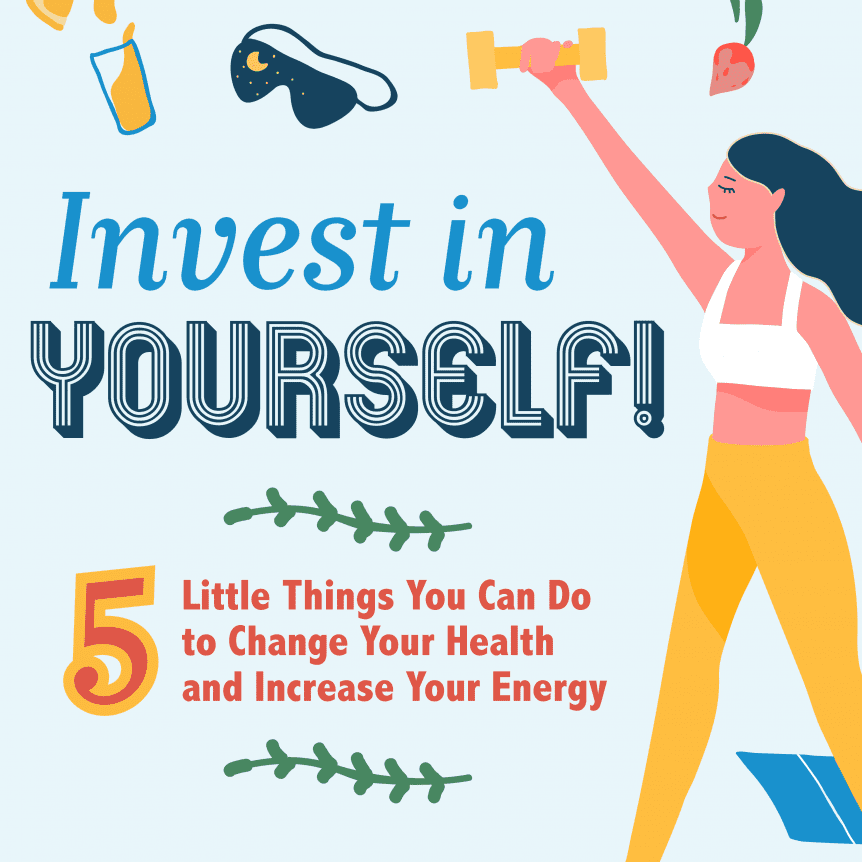One of the most common medical complaints is fatigue or lack of energy. Feeling exhausted has been a problem for decades, but there are healthy changes you can make, proven to increase energy and lift the fog.
1. Mind Your Diet
The old adage, “what you put in is what you get out,” is certainly true when it comes to nutrition. A healthy diet consists of lots of fruits and vegetables – ideally about 50 percent of your food volume, together with lean protein, complex carbohydrates and healthy plant fats. Consuming fresh and natural foods powers our brains and improves mood. They are also naturally anti-inflammatory. Low-level chronic inflammation is a risk factor for many diseases ranging from diabetes and heart disease to cancer and Alzheimer’s Disease, all of which are associated with fatigue. A healthy diet should include lots of hydration, preferably water, about one ounce per kilogram of body weight daily. Caffeine improves alertness but should be avoided after 2 p.m. so it won’t cause insomnia. Drink alcohol in moderation; it’s a sedative and can reduce sleep quality. Eating a wide variety of foods can help ensure that you get the vitamins and nutrients needed for energy including iron, vitamin B12, magnesium, vitamin D and trace minerals. Managing your diet also helps control weight, and in return, gives you more energy.
2. Stay Active
One of the worst outcomes of the COVID-19 pandemic is that we have become more sedentary. We know exercise elevates mood, and for some people, exercise is just as effective as an antidepressant. There is an abundance of evidence that exercise causes people to fall asleep more quickly and have better sleep quality, particularly when the exercise intensity is at least moderate.
3. Prioritize Rest
Sleep disorders and sleep-related disorders of breathing are the most common causes of persistent fatigue. One of the main reasons that we are so tired is that we are so busy. Americans work more than workers in any developed nation in the world. Our kids are busier than ever, seemingly always competing in academics and extracurricular activities. It’s okay to leave some things undone and to turn down some invitations. Make sure vacations include time to rest. Make sure your bedroom environment is conducive to sleep by controlling light, noise and interruptions. Try keeping devices in a different room. Developing a nightly ritual, like having a cup of tea and reading for a few minutes, can also help. In addition, people who go to bed and wake up at the same times every day, even on weekends, are much more likely to feel rested than those with erratic sleep patterns.
4. Face Emotional Problems Head-On
Psychosocial problems also cause fatigue. Depression, anxiety and attention disorders can cause problems with alertness and memory. They can lead to too much or too little sleep and can cause sleep quality to be poor. Talking to a therapist or seeking medical treatment for these disorders is proven to help. Other helpful interventions include massage therapy, mindfulness, breathwork, support groups and involvement in religion.
5. Go See Your Primary Care Doctor at Least Annually
The whole premise of preventative medicine is that healthy lifestyles result in fewer diseases. If medical problems do arise, they can be discovered before becoming symptomatic when there is a greater chance of cure or treatment. There are many treatments for conditions that cause fatigue, like hormonal problems and sleep apnea. Diagnosing fatigue is often a process of elimination. Your doctor will be able to evaluate symptoms, physical exam signs and test results to help you live your healthiest, most energetic life.


Dr. Pryor is an internist accepting new patients at Ochsner LSU Health Shreveport – St. Vincent Health Center, 6670 St. Vincent Avenue, and Ambulatory Care Center, 1602 Kings Highway.








